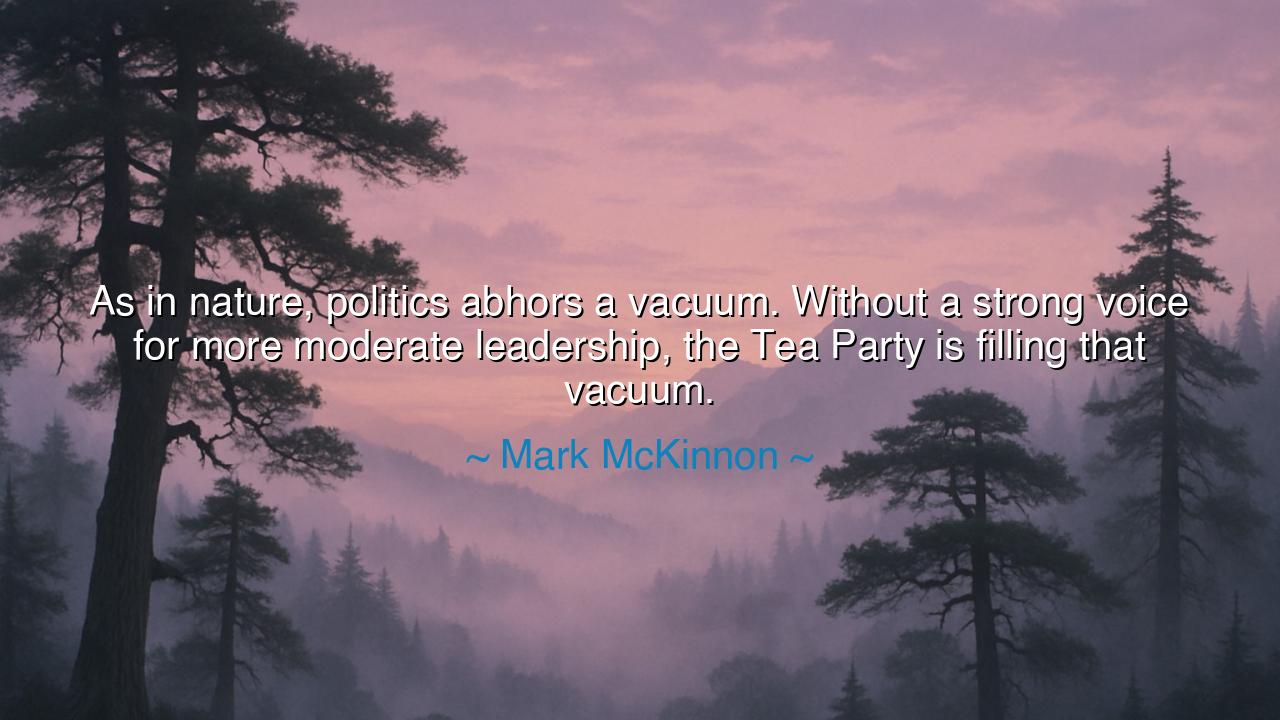
As in nature, politics abhors a vacuum. Without a strong voice
As in nature, politics abhors a vacuum. Without a strong voice for more moderate leadership, the Tea Party is filling that vacuum.






Hear, O listeners, the warning of Mark McKinnon, who declared: “As in nature, politics abhors a vacuum. Without a strong voice for more moderate leadership, the Tea Party is filling that vacuum.” In this saying, he draws from the ancient law of the cosmos, that empty spaces do not endure, but are swiftly filled. Just as the winds rush into voids, and waters flow to occupy the hollow places of the earth, so too in the realm of power: where there is no balance, no voice of temperance, there arises a force—often bold, often extreme—that takes its place.
The meaning of this truth is plain. In the absence of steady and moderate leadership, movements born of passion and urgency will rise to command the stage. Some may bring renewal, others chaos. But always, the silence of moderation creates an opening, and the eager fill it. McKinnon speaks here of the Tea Party, a force of fervent conviction that surged into American politics when the center seemed timid, uncertain, or unwilling to lead. He likens it to the natural law: there can be no lasting emptiness in the affairs of men.
History provides us with countless lessons. Consider the fall of the Roman Republic. When senators and consuls, once the guardians of balance, faltered in their duty, a void was created. Into this vacuum stepped generals—Marius, Sulla, and at last Julius Caesar—whose strength and willpower filled the emptiness left by failing moderation. The Republic, once governed by deliberation and compromise, was consumed by extremity, until the Empire arose. This tale, echoing across centuries, reveals what McKinnon warns: when the center fails, the fringes ascend.
Likewise, in the time of the French Revolution, when the monarchy crumbled and moderate reformers hesitated, the Jacobin extremists filled the void with their own fiery voices. The vacuum left by indecision was not left barren; it was seized by Robespierre and his followers, whose radical leadership brought the Terror. Thus history repeats: if moderate leaders will not rise, louder and more extreme voices will.
The origin of McKinnon’s words lies in the shifting landscape of American politics in the early twenty-first century. Discontent surged among citizens who felt unheard, and when moderation hesitated, the Tea Party arose with fire and resolve. Whether one judged it for good or for ill, it was proof of his claim: power despises emptiness. To leave a vacuum in politics is to invite its filling, not by calm voices, but by those who shout the loudest.
The lesson, O listener, is both warning and guide: if you desire balance in society, do not neglect the center. Support voices of reason, courage, and moderation, for their silence creates the breeding ground for extremes. If the wise retreat from the field, the zealous will occupy it; if the calm hold their tongues, the passionate will dictate the future. A vacuum of leadership is not a place of rest—it is the spark that summons storms.
Practical action lies before you: do not despise moderation as weakness, nor dismiss compromise as cowardice. Instead, encourage leaders who speak with steady wisdom, who can bind extremes together, and who dare to lead when others hesitate. If you yourself are called to lead, do not wait for the vacuum to form—step forward, fill it with clarity, and guard against those who would exploit it for their own ends.
Thus remember McKinnon’s words: “As in nature, politics abhors a vacuum.” Where balance fails, extremity rises; where moderation is absent, division thrives. Let us, therefore, honor the strength of measured leadership, lest the void be filled by forces that consume rather than build. For in the dance of power, there can be no emptiness—only the question of who shall rise to fill it.






AAdministratorAdministrator
Welcome, honored guests. Please leave a comment, we will respond soon